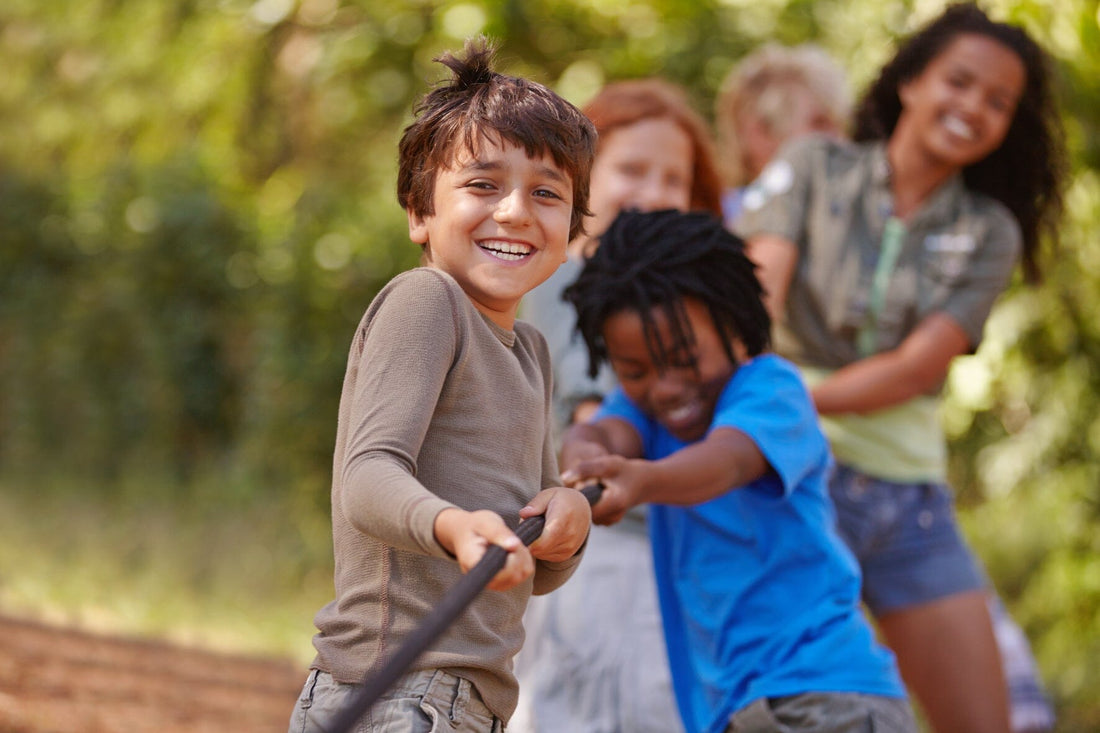It’s not unusual for most children to get a bit nervous when starting summer camp, especially if they’ll be surrounded by unfamiliar faces in unfamiliar surroundings. But for an anxious kid, the idea of being away from home for entire days (or weeks!) can be especially daunting.
Read on to find out how to help your child prepare and maybe even get excited about their adventurous summer ahead.
The Benefits of Summer Camp for Kids
From building new friendships to fostering independence, there are so many benefits of attending summer camp for kids. Summer camp even has the power to positively impact the community at large. According to the American Camp Association, many campers' parents have reported that when their children return home from camp they are “more caring … more equipped to stand up for what they know is right, and are willing to be more responsible.”1 When these qualities are instilled at a young age through positive role models, your child has a better chance of growing up to be a more compassionate, generous, and responsible adult.
Other benefits of attending summer camp include:
- Learning leadership skills
- Teamwork
- Time away from screens
- Connecting to nature
- Promotes self-esteem
- Builds a sense of community
- Exercise
- Lifelong memories
Tips for Supporting Your Anxious Child
Common childhood anxiety symptoms like avoidance and clinginess are no match for a well-devised plan. From letting your child choose the camp experience to visiting the camp ahead of time, the following 10 tips will help get your child ready for the ultimate summer.
Shine Brighter
1. Make Sure They Feel Involved in Choosing the Camp
Allowing your child to help choose the camp experience will give them a sense of empowerment. They are also more likely to be excited about something they picked. There are so many camps now with different focuses, from space camp to surf camp, so try to find something aligned with your child’s interests.
2. Start Smaller with Individual Sleepovers (Especially with Sleepaway Camps)
If you’re sending your child to a sleepaway camp, be sure they know what it’s like to sleep in a new environment by setting up some sleepovers beforehand. You might warm up to this by hosting the first sleepover at your place and then switching off with another family.
3. Talk About Their Feelings
Be a safe place for your child to vent. Let them know that no topic is off limits and that you’re willing to hear them out and answer any questions they have about the camp experience. Letting them express their fears is one of the most effective ways of learning how to cope with them.
4. Visit the Camp Ahead of Time
Visiting the camp ahead of time is a wonderful way to help your child set expectations. It’s much easier to fear the unknown, so walking around the grounds and talking to some of the counselors will fill some of the gaps. If you cannot visit the camp ahead of time, check out the camp website together, browse photos of past groups, and watch videos if they’re available so they can start becoming familiar with the idea.
5. Share Your Own Camp Stories
Do you have fond memories of your own camp experiences? Or photos? Share these with your child and let them know how you felt in the days and weeks leading up to the start of camp. How did you cope? Did it exceed your expectations?
6. Remain Positive
Acknowledge your child’s fears but try to remain positive. If your child seems plagued by worst-case scenarios or endless “what if” questions, listen and empathize and then try to steer their attention towards what could go right instead of what could go wrong. Remind them of times in the past they feared the worst only to be pleasantly surprised by the outcome.
7. Don’t Trivialize Their Concerns
“Every kid loves camp!” “Stop worrying so much!” Be sure not to trivialize your child’s feelings, no matter how irrational they may seem to you. Dismissing their fears may only make them feel insecure and alone with their concerns. Figure out solutions together.
8. Make Communication Easy & Accessible
There’s no need for you to cut off communication completely when they’re at camp. Plenty of camps will have dealt with anxious kids before and they likely have a set of protocols you can follow to keep communication easy and accessible. Maybe this means a timed afternoon call or text message or an email every night.
9. Share Your Child’s Learning Issues or Disabilities with Camp Staff
Make sure the camp staff is fully aware of any learning issues or other disabilities so they can be sufficiently prepared. Is your child afraid of the dark? Get them special permission to sleep with a night light or carry around a mini flashlight. Do they wet the bed? You may be able to set them up with a disposable bed mat or other helpful provisions. Having these kinds of conversations is another good reason to visit the camp beforehand and familiarize yourself with the staff.
10. Keep Goodbyes Brief
If your child sees you lingering around at drop-off time to make sure they’re okay, chances are they’ll hang on to you tighter. Keep your goodbyes brief, and confidently send them off with well wishes. This may be hardest the very first time you leave them, but by the time you’re ready to pick them up, your anxious child may just be a summer camp pro. But don’t be surprised if they can’t keep their own goodbyes brief with all their new camp friends.
Keep in mind that although there are so many benefits to summer camp, it’s not for every child. This is especially true for sleepaway camps. If your child is adamant about not going, have some backup plans in place to ensure the summer is still fun, productive, and full of learning experiences.
Explore our ultimate summer guide for kids with ADHD for even more ideas on how to have a fruitful summer, whether your child has an attention disorder or not.
And if you’re looking for more support, summer is also the perfect time to try Brillia, a non-prescription, clinically-proven medication for anxiety in kids aged 5-18. Available without a prescription or official diagnosis, Brillia gently and impactfully reduces symptoms of anxiety, inattention, irritability, and restlessness without harsh, synthetic chemicals or harmful side effects.
Learn more about how Brillia works and find other resources on managing anxiety at the Brillia(nce) Resource Center.
Get a whole bunch of support right in your inbox.







